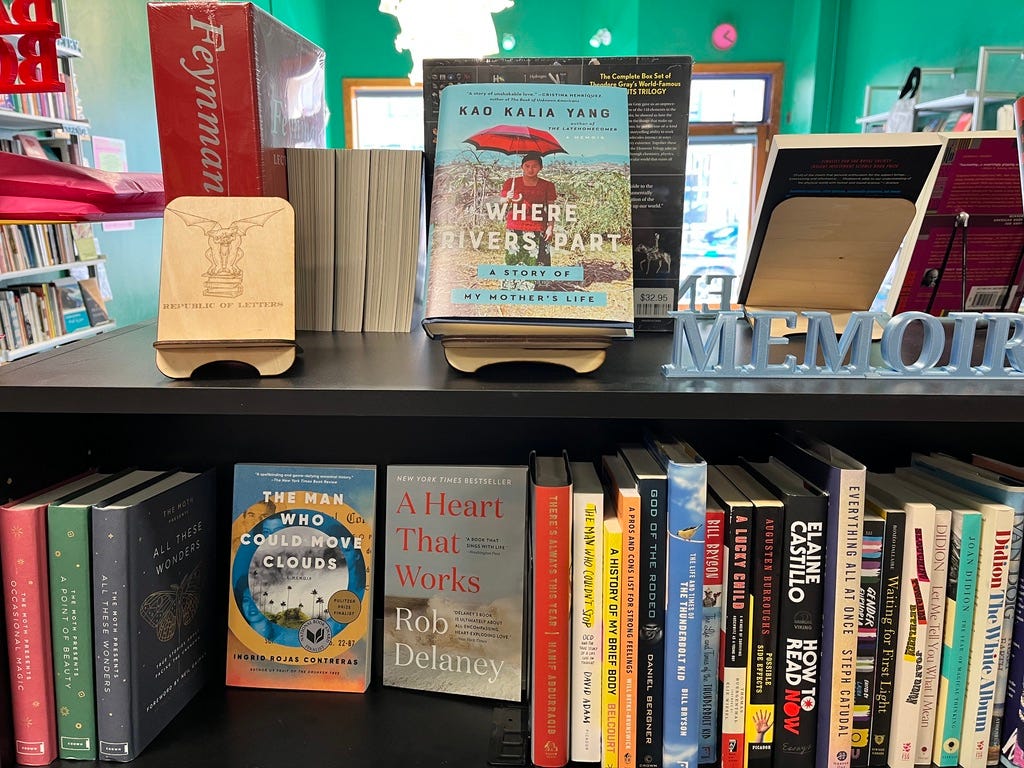The Importance of Being a Reader
Newsletter
“The truth is rarely pure and never simple.”
― Oscar Wilde, The Importance of Being Earnest
One of my favorite parts of being a bookseller is filling that empty space where a book once was.
I get to decide which cover goes out next.
A book I’ve read and can recommend with confidence?
An author that deserves more attention?
A title that seems relevant to the current times?
The joy comes from helping others find their next read, from being seen as knowledgeable about literature, and from creating a space where others feel as though they belong.
Just as I fill empty spaces as a bookseller, I once filled spaces in my classroom library, arranging books I thought my students needed to see. Similar guidelines as a bookseller were applied. My goal was to get books in the hands of readers.
But while the goals are similar, a classroom library is not the same as a bookstore. As a bookseller, I am creating the conditions to sell books. As a teacher, I was building readers.
When I was doing all the work of organizing and managing a classroom library, I was also depriving my students of the necessary skills of becoming a reader. I thought I was serving them. But really, I was serving myself.
Eventually, I allowed students to become curators. Their excitement in sharing books with each other became as essential to building readers as the act of reading itself.
The joy of being a reader doesn’t come from just reading. Students find delight in helping a peer find a book that will delight them. They are seen as competent when they surface an author that others aren’t familiar with yet. Each reader brings their own background knowledge with them to the classroom, which can lead to recommendations that reflect what’s relevant in their lives.
I’ve made this case in the past, here and at conferences. My position was primarily centered on the students.
Following this week’s election, I was saddened to see so many people support a leader whose policies contradict their own needs. I’m convinced that it’s more vital than ever to equip our students not just with reading skills, but with the understanding of what it means to be a reader.
Here is a starter list of skills and dispositions that seem necessary going forward:
Developing the ability to finish entire books without rewards or accountability. (Yes, it’s an issue.)
Cultivating curiosity that extends beyond favorite genres and formats.
Supporting niche interests in reading, especially among males.
Using social media primarily for sharing and responding to what people create, and fostering human connection.
Writing in response to what we read, and thereby processing our understanding to create new ways of thinking and perceiving the world.
Teaching critical thinking and how to be a wise consumer of information shared online.
Centering speaking and listening as core standards to engage in civil discourse and apply critical thinking skills in productive ways.
If we expect our students to make responsible decisions about the leadership of our country in the future, we have to empower them with the responsibility and the capacity to make decisions as readers. We cannot keep doing all this work on their behalf. It’s helping no one.
Developing thoughtful, engaged readers isn’t just about fostering a love of books—it’s also about equipping them to navigate a complex world with discernment, empathy, and the courage to make informed choices that shape a better future for all.
Take care,
Matt
Related Resources
Speaking of engaging and empowering classrooms, I saw the short documentary about University of Wisconsin-Madison art teacher Lynda Berry this week. Berry breaks down barriers from the start: each student selects a nickname they will go by during the course. No status or posturing. You can watch the film for free here.
In trying to recover from the election, I appreciated Oliver Burkeman’s latest post from his newsletter, The Imperfectionist. His advice - “while it’s important to argue for the world you’d like to see, through activism and advocacy, it’s perhaps even more important to live it” - reminded me to focus on next actions and what I can control. You can read his post here.
If you are looking for direction on how to empower your students as librarians, check out the action research I engaged in with Micki Uppena here, here, and here. The last linked article highlights the 17% increase in reading achievement of the average student who engaged in the book budget project, in addition to the positive outcomes in reading engagement and reader identity.


Very powerful, informative, and practical article on the joy of reading and what it means to be a reader. Great information. Thank you Matt!